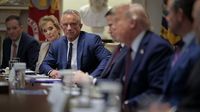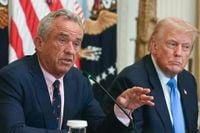In a tumultuous week for American public health leadership, the Trump administration’s overhaul of the Centers for Disease Control and Prevention (CDC) and the ongoing controversy surrounding Health and Human Services Secretary Robert F. Kennedy Jr. have sparked fierce debate among lawmakers, scientists, and the public. The drama unfolded in late August 2025, when CDC Director Susan Monarez was abruptly fired after refusing to endorse vaccine guidance containing anti-vaccine talking points, according to NBC News. Her ouster triggered a wave of resignations among top CDC officials, including Dr. Debra Houry, Dr. Demetre Daskalakis, Dr. Daniel Jernigan, and Dr. Jen Layden, marking one of the most significant leadership shakeups in the agency’s recent history.
The leadership crisis at the CDC is just one facet of a broader reshaping of federal health policy under Secretary Kennedy, a longtime vaccine skeptic. Since taking office earlier in 2025, Kennedy has fired all 17 members of the CDC’s vaccine advisory panel, the Advisory Committee on Immunization Practices, and replaced them with his own appointees. This new panel soon received a presentation from an anti-vaccine activist, featuring claims widely debunked by the scientific community.
Sen. James Lankford, R-Okla., when pressed on NBC’s “Meet the Press” on August 31, declined to state he had “100% confidence” in Kennedy’s stewardship. However, he stopped short of outright criticism, saying, “I don’t think he’s gone a wrong direction in this.” Lankford noted that Covid vaccines remain widely accepted and encouraged Americans to get their flu vaccines, but he acknowledged the heated debate over Covid vaccine availability for children, remarking, “That’s been a conversation where doctors widely disagree on this.”
Lankford described Kennedy’s actions as “pushing the boundaries,” but insisted that questioning established assumptions is not inherently wrong. “I think he is challenging some of the assumptions that a lot of Americans have asked,” Lankford said, referencing questions about food, autism, and other health trends in America. He added, “[Kennedy is] pushing the boundaries, but he also seems to be following the science. It’s not wrong to be able to ask hard questions. It is wrong to ignore the science. I don’t see him ignoring the science. I see him asking the hard questions.” Lankford clarified that he does not believe vaccines cause autism: “I don’t connect those two at all, but there are reasonable questions to say, Why do we have more cases of autism here? What is it? But I don’t think they’re connected to vaccines.”
Yet, not all lawmakers are as measured in their assessment. Sen. Bernie Sanders, I-Vt., issued a scathing rebuke, calling for Kennedy’s resignation and warning of “a real public health crisis for America.” Speaking to Fox News Digital on September 1, Sanders stressed, “Vaccines work. They save millions and millions of lives.” He accused Kennedy of advancing conspiracy theories and said, “despite the overwhelming opposition of the medical community, Secretary Kennedy has continued his longstanding crusade against vaccines and his advocacy of conspiracy theories that have been rejected repeatedly by scientific experts.” Sanders pointed to Kennedy’s claim that “there’s no vaccine that is safe and effective” as particularly dangerous, and noted that one of Kennedy’s cited experts had his medical license revoked and his study retracted. In an op-ed for the New York Times, Sanders further charged, “if Kennedy and his friends are able to make people think that vaccines are not safe, it will be a real public health crisis for America.”
Bipartisan concern has grown in Congress, with some members from both parties expressing alarm at the mass firings and resignations at the CDC. The White House, however, has stood by its decisions. Press Secretary Karoline Leavitt defended Monarez’s firing, stating on September 1 that the president has “authority to fire those who are not aligned with his mission.” Leavitt argued that the administration and Kennedy are “committed to restoring trust and transparency and credibility to the CDC by ensuring their leadership and their decisions are more public-facing, more accountable, strengthening our public health system and restoring it to its core mission of protecting Americans from communicable diseases, investing in innovation to prevent, detect and respond to future threats.”
The controversy comes at a time of shifting federal vaccine policy. On August 27, the Food and Drug Administration approved a new round of Covid vaccines, but limited eligibility to those at higher risk of severe illness. President Donald Trump, in a Truth Social post on September 1, called on pharmaceutical companies to “justify the success” of their Covid drugs, writing, “Many people think they are a miracle that saved Millions of lives. Others disagree!” Trump also referenced the CDC’s leadership upheaval, saying, “With CDC being ripped apart over this question, I want the answer, and I want it NOW.” He accused drugmakers of withholding information, stating, “I have been shown information from Pfizer, and others, that is extraordinary, but they never seem to show those results to the public. Why not???” Trump urged greater transparency to “clear up this MESS,” and criticized the internal conflicts between Kennedy and the CDC.
In a guest essay published in the New York Times on September 1, nine former CDC directors warned that Kennedy is “endangering” Americans’ health and described his actions as “unlike anything we have ever seen at the agency, and unlike anything our country has ever experienced.” They voiced concern about the “wide-ranging impact that all these decisions will have on America’s health security.”
The leadership crisis at the CDC has also coincided with broader debates over the Trump administration’s approach to economic and public safety policy. On August 31, Sen. Lankford praised President Trump’s efforts to use tariffs as an economic tool, despite a recent appeals court ruling that found Trump had misused his authority by imposing tariffs without congressional approval. Lankford asserted, “The president is accomplishing his economic goals with tariffs,” and indicated the administration would appeal the decision to the Supreme Court. He also advocated for the Federal Reserve’s independence within a collaborative economic approach, stating, “The Federal Reserve is at its best when it’s independent, but they’re not independent of the entire American people.”
On the issue of public safety, Lankford supported Trump’s decision to send National Guard troops and federal law enforcement to Washington, D.C., earlier in August to curb crime, and suggested that other cities should invite similar assistance. “I would say the people of Oklahoma would welcome any help that we can get to be able to deal with criminal issues,” he said, adding that cities like Chicago “should be asking for help rather than pushing help away.”
As the Trump administration’s overhaul of public health institutions continues to reverberate through the federal government, Americans are left grappling with questions about scientific integrity, transparency, and the future of vaccine policy. The coming months will test the nation’s ability to balance skepticism and science, leadership and accountability, in the face of mounting public health challenges.


